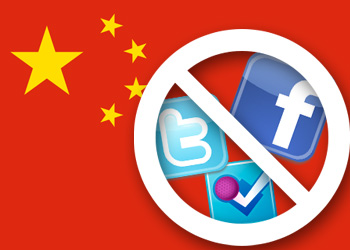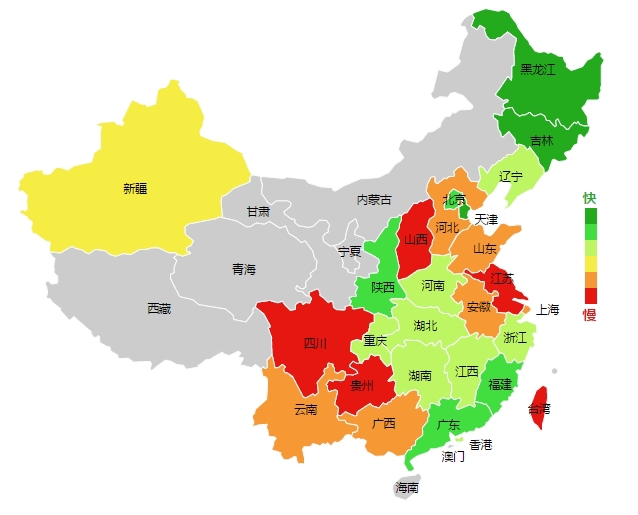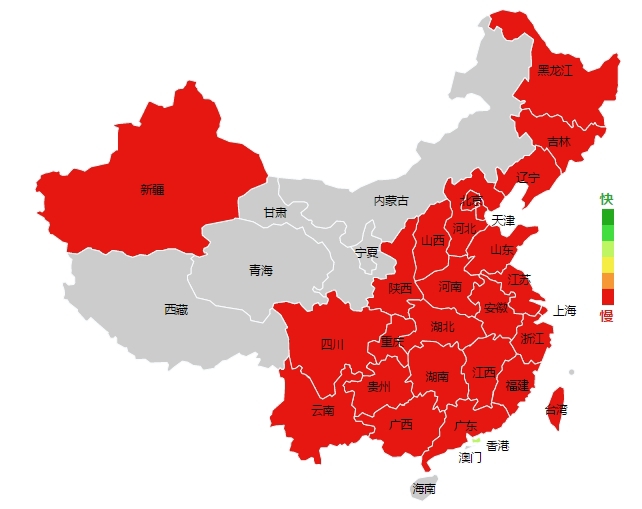Who is blocking the Chinese firewall?

Illustration from article article.yeeyan.org
The post is based on the TechAsia article " Oh, Big Brother: you are now blocked in China " and personal experience.
Not so long ago, we talked about what was going on in the Chinese Internet , "who is who," and constantly had to mention those or other blocked foreign sites. If you somehow plan to develop a business with the participation of the Chinese audience, then you should keep in mind which social buttons should not be added, and which services will generally make your project inoperative for the Chinese.
A bit of history

First Chinese Internet Connection, 1994. Illustration from cctv.com
')
On April 20, 1994, the Institute of High Energy Physics of the Chinese Academy of Sciences created the first cable Internet connection from China to North America and Europe. The photo captures the moment of the first Chinese Internet connection.
A few years later, the Chinese government began work on restricting this new type of communication. Of course, at that time not many could afford access, but it was already clear that this is absolutely not a controllable channel for the dissemination and exchange of information.
Work on the Golden Shield project (金盾 工程 jīndùn gōngchéng) began in 1998, and at the end of 2003, the famous Great Chinese Firewall began its work.
Over the past ten years, the control system has grown to unprecedented proportions. Access is even blocked to international projects worth billions of dollars - Facebook, Google, and so on. Of course, a certain number of Chinese geeks can “climb over the fence” (翻墙 fānqiáng - this is how the Chinese call their firewall bypass). Most of them use foreign resources just for fun, to keep up with the trend and to watch funny videos and pictures with cats. Some need access to the pages they created before large-scale cleanings.
True, after the recent blocking of Gmail, you now have to look for an alternative to even mail services.
In an article on TechAsia, the author writes that, for example, such harmless sites like MySpace are not blocked in China - allegedly they are not engaged in the dissemination of “harmful information”. But it is not so. Using resources like ce.cloud.360.cn, you can ping a specific URL and measure speed from each Chinese province. This is what MySpace accessibility looks like:

Map availability MySpace by provinces of China
However, even despite Beijing’s “green color,” MySpace cannot be opened here.
For comparison, this is what Facebook completely blocked looks like:

Facebook Accessibility Map in China
Attentive readers will notice the strange behavior of Taiwan, to which continental Chinese censorship, like Hong Kong and Macao, does not apply. So far, I see an explanation for this only in that the Chinese service drives the data to the “party opinion”, according to which Taiwan is just a province of China, and not a sovereign republic.
Some popular services remain unblocked, such as Vine . But Instagram is blocked selectively: you can install and use on iOS. The Android version has been removed from all Chinese markets (yes, there are a lot of them) this summer, but the previously installed application will continue to work. Only not from the mobile Internet from China Mobile - for some reason, their Instagram servers are blocked. In any case, things can change on any given day - the search engine DuckDuckGo was blocked quite unexpectedly this month.
UPD: Instagram 2014.09.29 blocked finally.
So who is blocked?
The author of the original article walked through the first 1000 sites from Alexa through the port of GreatFire.org to create a list of blocked resources.
The important thing is that blocking such large sources of information creates a certain information vacuum in China on some topics. Therefore, the bulk of the block list is not large entertainment portals, but thousands of small sites that publish information on issues of concern, events on Tiananmen Square and the like. They began to block immediately after the launch of the Golden Shield, and long before the first Twitter blockages in 2009.
In addition, some scientific sites and other portals, one way or another connected with the development of freedom of speech in the country, are blocked. Of course, blocking makes life difficult for many educational institutions and interferes with business - there can be no talk of "cloud office suites" here.
And the firewall itself is designed in such a way that all traffic of a multi-million Chinese Internet audience is driven through its server, which catastrophically affects the speed of operation of foreign services in China, even if they are not blocked. Even before Google’s full blocking, its search engine worked so slowly that it repelled Chinese users from using it. This became a catalyst for the development of search engines such as Baidu and Sogou .
So, here is a list of well-known services and sites blocked in China:
Social networks
Twitter, Facebook, Google+, Google Hangouts, Google Blogspot, WordPress.com, Line, KakaoTalk, TalkBox, some Tumblr pages, FC2, Soundcloud, Hootsuite, Adultfriendfinder, Ustream, Twitpic
Media and information sites
New York Times, New York Times Chinese, Bloomberg, Bloomberg Businessweek, BBC Chinese, Chosun Chinese, WSJ, WSJ Chinese, Flipboard (international version), Google News, YouTube, Vimeo, Dailymotion, LiveLeak, Break, Crackle, some Wikipedia articles, some articles of Chinese Wikipedia, Wikileaks
Search engines
Google, DuckDuckGo, Baidu Japan, Baidu Brazil, Yahoo Hong Kong, Yahoo Taiwan
Application Services
Microsoft OneDrive, Dropbox, Slideshare, iStockPhoto, Google Drive, Google Docs, Gmail, Google Translate, Google Calendar, Google Groups, Google Keep
Other online tools
Flickr, Google Play, Google Picasa, Feedburner, Twitter URL shortening, Google URL shortening, Bit.ly, Archive.org, Pastebin, Change.org, 4Shared, The Pirate Bay, OpenVPN
We will not list all Google services, since virtually all of them are now banned - and YouTube , and even Google Play (because of the latter, the Chinese do not suffer, they have their own application markets in excess).
Conclusion
This is just a small part of blocked sites and services. It is necessary to understand that for the mass Chinese audience to make any links and links with the listed services is not only useless, but can also harm your project. Any Facebook widget will slow down the page load a hundred times. We should also highlight such important services as Google Fonts API - its blocking affects all sites that use Google fonts: at best, the site just opens very slowly, like my blog , at worst - it does not work at all.
The list is far from complete, actively changing and supplemented. While working with China, read the news and keep abreast.
I wish you never fall into the black lists of the Golden Shield!
Note 1 : of course, porn sites are not included here, the war with which, unlike Facebook, goes on at the official level quite openly (for finding such sites even earlier paid extra for ordinary citizens). In this case, sex shops in China are on every corner, but that's another story.
Note 2 : I deliberately do not provide links with information about taboo topics, because I don’t want to block Habr in China.
Note 3: Yes, the American article, and here, of course, about freedom of speech. Share your opinion in the comments!
The article is based on the TechAsia article " Oh, Big Brother: you are now blocked in China " and personal experience.
Source: https://habr.com/ru/post/238379/
All Articles